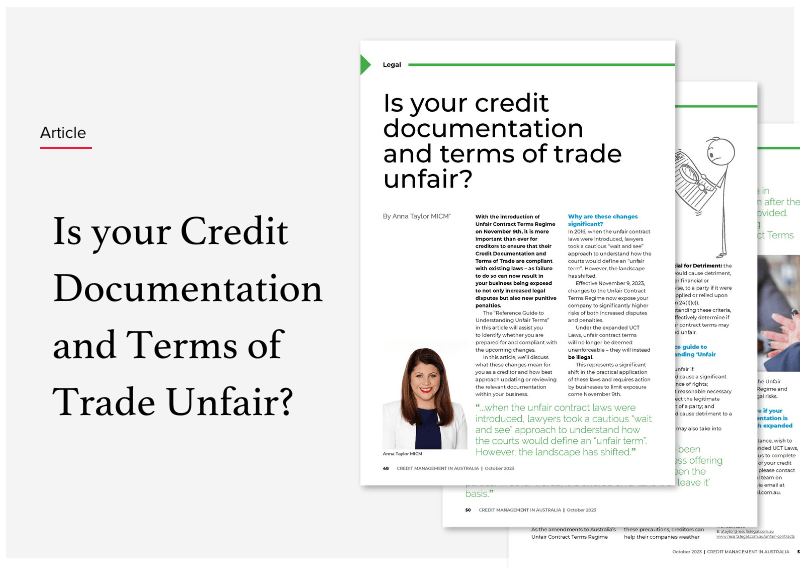With the introduction of Unfair Contract Terms Regime on November 9th, it is more important than ever for creditors to ensure that their Credit Documentation and Terms of Trade are compliant with existing laws – as failure to do so can now result in your business being exposed to not only increased legal disputes but also new punitive penalties.
In this article, we’ll discuss what these changes mean for you as a creditor and how best approach updating or reviewing the relevant documentation within your business.
Why are these changes significant?
In 2016, when the unfair contract laws were introduced, lawyers took a cautious “wait and see” approach to understand how the courts would define an “unfair term”. However, the landscape has shifted. Effective November 9, 2023, changes to the Unfair Contract Terms Regime now expose your company to significantly higher risks of both increased disputes and penalties.
Under the expanded UCT Laws, unfair contract terms will no longer be deemed unenforceable – they will instead be illegal. This represents a significant shift in the practical application of these laws and requires action by businesses to limit exposure come November 9th.
Which contracts will the new regime effect?
The expanded UCT Laws will apply to standard form small business contracts and consumer contracts entered into or varied on and from 9 November 2023.
Standard form contracts are contracts that have been prepared by one party to the contract (the business offering the product or service) without negotiation between the parties. In other words, it is offered on a ‘take it or leave it’ basis.
A contract is classified as a small business contract when:
-
- it involves the supply of goods or services, or the sale or grant of an interest in land; and
- at least one party to the contract is a small business, employing fewer than 100 people and/or having an annual turnover of less than $10 million.
If the ASIC Act applies (if the contract relates to the supply of financial products or services), the contract must also have an upfront price no greater than $5 million.
A contract is deemed a consumer contract when it entails the supply of goods or services, or the sale or grant of an interest in land, to an individual for personal, domestic, or household use and consumption.
How should you prepare for the impending changes?
Your business should be reviewing its standard form contracts and terms and conditions now to ensure they are compliant with the expanded UCT Laws, once they enter into force on 9 November 2023.
What are the key elements for identifying unfair clauses?
When assessing whether any of your contract terms are unfair, it is crucial to consider Section 24 of the Australian Consumer Law. This section outlines three key elements that define an unfair contractual term:
-
- Significantly Imbalanced Rights and Obligations: A term that creates a substantial disparity in the rights and obligations of the parties involved (section 24(1)(a)).
- Lack of Reasonable Necessity: The term is not reasonably necessary to protect the legitimate interests of the party who would be advantaged by the term (section 24(1)(b)).
- Potential for Detriment: the term would cause detriment, whether financial or otherwise, to a party if it were to be applied or relied upon (section 24(1)(c)).
By understanding these criteria, you can effectively determine if any of your contract terms may be deemed unfair.
Reference guide to understanding ‘Unfair Terms’
A term is unfair if:
-
- it is not reasonable necessary to protect the legitimate interest of a party; and
- it would cause detriment to a party.
- it would cause a significant imbalance of rights;
The court may also take into account the transparency of the term and the contract as a whole. The party alleging a term is unfair bears the onus of establishing it is an unfair term.
In determining whether a contract is standard form, the court may take into account:
-
- the bargaining power of the parties;
- who prepared the contract, and when this occurred;
- whether the only choice was to accept or reject the terms;
- whether there was an opportunity to negotiate; and
- whether the contract is tailored to the other party
Understanding what constitutes an unfair term is essential to ensure fair and balanced contracts and limiting exposure.
Each contract must be reviewed on a case-by-case basis and examined in the circumstances to determine whether the contract contains unfair terms.
Your documentation is your best defence
We are witnessing an increase in disputes over unfair terms, even after the service or product has been provided. This is due to businesses taking advantage of the Unfair Contract Terms regime.
With the rise of commercial disputes surrounding unfair contract terms, it’s become more important than ever for businesses to protect themselves with proper documentation.
Final considerations for creditors
As the amendments to Australia’s Unfair Contract Terms Regime come into play, companies and creditors must be aware of the potential risks and penalties that come with them.
The changes could expose businesses to legal disputes and punitive fines, which can have a significant impact on bottom lines. To mitigate these risks, it’s important to ensure that companies’ contracts comply with the new regulations.
Creditors must also be vigilant in identifying any unfair contract terms that could hurt their business, such as clauses that offer little to no benefit to customers or that limit the company’s liability. By taking these precautions, creditors can help their companies weather the changes to the Unfair Contract Terms Regime and stay on top of legal risks.
Are you unsure if your credit documentation is compliant with expanded UCT Laws?
If you need assistance, wish to discuss the expanded UCT Laws, or would like for us to complete a no cost review of your terms of trade or credit documentation, please contact the Results Legal team on 1300 757 534 or via email at info@resultslegal.com.au.




![[Webinar] Unfair Contract Term Changes are Imminent [hosted by BICB]](https://resultslegal.com.au/wp-content/uploads/2023/08/Webinar-The-New-Unfair-Contract-Terms-400x284.jpg)
![[Webinar] The New Unfair Contracts Terms: What it means for your business](https://resultslegal.com.au/wp-content/uploads/2023/05/Webinar_The-New-Unfair-Contract-Terms-400x284.jpg)

